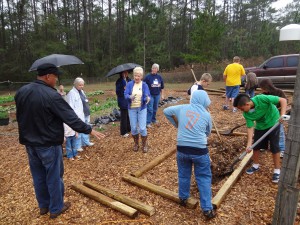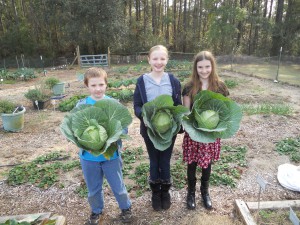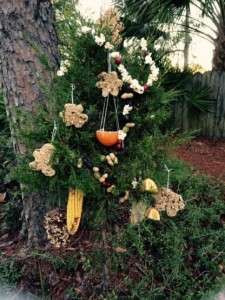by Stefanie Prevatt | May 29, 2015

Photo credit: Zulema Wibmer, 4-H Program Assistant, Leon County 4-H Office
Garden-based education is taking America by storm. While this is concept dates as far back as the seventeenth century, it certainly feels like the popular movement of the day. 4-H has been using garden based education since 1902 with tomato and corn clubs to teach life skills such as resiliency, planning and organizing, and communication. These same skills are necessary to become a successful entrepreneur:
Resiliency: the ability to try again after failure. A garden is the perfect place for youth to test ideas or try new things. As adults, we know that sometimes the key to success is (safe) failure! If you are using a garden your classroom, allow creative experimentation. Success will build on itself and trials that missed the mark will make for more lively discussion and group cohesion.
Planning/organizing: the process of figuring out what to do (planning) and how to do it (organizing). Whether you are starting new or continuing an existing project, allowing the expression of youth ideas and goals – followed by their help implementing these plans – is crucial to your project’s success. Remember, we can grow all the vegetables in the world, but if the youth don’t learn or feel a sense of accomplishment related to the project, all we did was grow vegetables.
Communication: the exchange of thoughts, messages, or information, as by speech, signals, writing, or behavior. In today’s tech savy world, we are losing the ability to communicate in person and in writing. You have a unique opportunity to work with your group together, or as individuals, to discuss (or write descriptively) about your garden.

Photo credit: Zulema Wibmer, 4-H Program Assistant, Leon County 4-H Office
UF IFAS Extension offers many resources to help both youth and adults become entrepreneurs in the food industry. Food entrepreneurship has really exploded with the Cottage Food Law. Many County Extension Offices offer workshops and seminars on food entrepreneurship, and there are also some great online resources to help you get started:
If you have a green thumb, consider going “totally green” as a 4-H gardening volunteer or Master Gardener. 4-H needs caring adults like you to share their knowledge and passion for gardening with the next generation. Through the 4-H gardening project, youth not only learn gardening knowledge and skills, they also learn responsibility, teamwork, and other life skills that will help them grow up to be compassionate and competent citizens. To get involved, contact your local UF IFAS Extension Office, or visit http://florida4h.org./volunteers.
Your opinion matters! Please provide feedback on this short survey to help us improve our blog: https://ufl.qualtrics.com/SE/?SID=SV_3gtLKjqia3F75QN
by pmdavis | Jan 5, 2015

While youth are home over winter break, encourage them to do something fun that will attract wildlife. Nothing is more fun than watching birds or squirrels play in your yard. One way to make this happen is to provide a supplemental food source for them. You can create a special “Tree for Wildlife” in your yard. In fact, a great family activity is making some very inexpensive simple feeders. The most wonderful part is these feeders, they not only look attractive, but help wildlife survive through the winter.
You can create feeders out of bread, bird seed and a binding agent like eggs, lard or peanut butter. Cut stale bread into shapes with cookie cutters. Make a small hole in the top to put twine or string through. If using egg, brush the bread with egg wash and dip in seeds. Then let it dry for a day or so. Attach string and hang in the trees. If using lard or peanut butter, toast the bread to dry it out then spread like you would on a sandwich and roll in bird seed.
Another type of feeder that is popular especially if you have lots of pine trees are pine cone bird feeders. Attach string to a pine cone. Mix peanut butter and oats together then apply to pine cone. After the cone is covered with the mixture roll in bird seed. Lard can be used in place of peanut butter. Hang from tree.
One last type of feeder is using apple and orange slices. Cut thin slices of apples and oranges, attach string and hang each slice separately all around the tree.
Additional feeders could be strings of grapes, raisins, cranberries, raw peanuts, salt free crackers or popcorn. If you are using popcorn be sure it does not have butter and salt. Just use a needle and thread to make the strings. All edible decorations should be hung with biodegradable materials such as cotton string, twine, or thread.
For more information to help you invite wildlife into your yard check out Junior Master Gardener: Wildlife Gardener or Cornell Feeder Watch. Inviting wildlife into your yard provides a fun way for kids to develop a culture to care about nature, while teaching them about their environment. It also makes a great family traditional activity to do not only during the holiday season but throughout the year. 4-H is one of the nation’s most diverse organizations and includes people from all economic, racial, social, political, and geographic categories. There are no barriers to participation by any young person. Participants are given the opportunity to engage in activities that hold their personal interest, while being guided by adult volunteers. The local 4-H Agent is a youth development professional who provides direction and program leadership as part of the nationwide Cooperative Extension System. For more information, contact UF/IFAS Extension at http://florida4h.org/
.
by Melanie Taylor | Jul 9, 2014

4-Hers still enjoy swimming and kayaking in the Choctawhatchee Bay. Photo provided by Jackson County 4-H.
Summer is here, and for most 4-H families, that means camp is on the horizon. If this will be your child’s first summer camp experience, you and your child both may have some camp anxieties. But never fear! Here are some simple steps you can take to prepare your camper (and yourself) for camp:
Preparing Campers:
• Plan several sleep overs before the week of camp arrives. Resist the urge to pack their bags for them or to check on them while there. If they have a cell phone, have them leave it at home. This is a good way to practice not having direct or constant contact.
• Encourage them to write a letter to someone (maybe you) while at camp. You will be so excited when you receive a letter from camp! Be sure to include envelopes, addresses, stamps, paper, and a pen in their luggage.
• Gear up physically. If you have purchased new tennis shoes, break them in with a few long walks, so the blisters don’t have to happen at camp.
• Especially for teenagers, have them take a mini-vacation from their electronic devices. A couple of hours or a weekend.
• Have them write a statement for their social media pages. “Peace out Facebook, I will be at camp for the next week. Check in with you when I get back.” Or something similar.
• Have them write down their goals for camp. So they can mentally prepare themselves for what they hope to do and see.
• Make a homesick plan:
1. Homesickness isn’t entirely bad. It’s great to love your home. It’s sometimes part of the process, and it’s a confidence booster when a camper gets through it.
2. Make a happy place plan and write it down. This is an amazing opportunity to learn a life skill. Today’s youth go to technology to escape, and studies show this increases their stress. Some ideas might be: taking 10 deep breaths, traveling to a happy place in your mind, packing a certain stuffed animal, or tossing a football. They are capable of this independence.
3. Your plan should NOT be, “Give it a couple of days and if you don’t like it, we will come get you.” This will set them up to give it a couple of days and knock the confidence right out of them.
4. Let your camper know what to expect with correspondence. You don’t need to write every day, but let them know what to expect.
Parents:
• You are giving your child an incredible gift. I cannot promise you that they will not lose some socks, that they will love every meal or activity, or that they will adore every counselor. But you are preparing them for college and beyond; you are giving them the freedom to gain confidence, independence, and leadership skills; and you are instilling in them that they can do it.
• What do YOU want to do during their time at camp? Plan a vacation for a later time, time to organize, time to have one-on-one time with your other children, or some “date nights” with your spouse or friends.
• If you have apprehensions, work to resolve them. If you are worried that your camper is not going to know anyone, set up a pre-camp get-together. If you are worried about your camper’s medical needs, become friendly with the camp staff. If you are anxious about their food allergies, talk to the camp’s director. Make a camper-sick plan for yourself. Make sure there is only excitement and optimism coming from you, and share your anxiety with another adult.
• Pack self-addressed envelopes in their luggage.
• Whether they are flying or driving, refrain from crying your eyes out until they cannot see you. Take a deep breath, trust, and remind yourself that you are giving them an awesome gift.
And, what is this gift everyone is talking about? At camp, they will be part of a community all their own. They will become emotionally attached to handmade rope bracelets on their wrist, and have a song for any occasion on cue, and maybe even forget they need to shower, and think sunscreen is just a normal daily moisturizing technique. They will learn to do things on their own, and they’ll learn to rely on others. They will learn how to survive on their own for a week or two, and they’ll learn how to help each other through it.
They may even grow up on summers away from TV, and forget Facebook exists. They will relish in the joy of sleeping in cabins, swatting mosquitoes at campfire, and swimming every day. They will savor the feeling of pushing water behind them with a paddle and the whoosh of air behind the tail of an arrow as they fire. They’ll forget about appearances, relish tan lines, and recognize the beauty of a smile over anything else.
So send your kids to camp. Send them so they’ll learn to set tables and make beds and wake early. Send them so they’ll know how to be a leader, paddle a kayak, weave a bracelet, and sing as loud as they can. Send your kids to camp so they’ll learn to love themselves and learn to love others. Send your kids to camp because they’ll realize who they are, or who they want to be. And, prepare yourselves for a year of camp stories, and for a flurry of songs. Prepare to learn names of kids you’ve never met. And for your kids to have a need for sunshine, a need for campfires, and companionship. They will be forever grateful for your awesome gift of summer camp.
Source:
American Camping Association, Inc. (http://www.acacamps.org)
by jgl1 | Nov 8, 2013
John G. Lilly
jgl@ufl.edu
Jefferson County Extension Director/4-H Agent
Young people in 4-H are committed to improving their communities. Dr. Richard Lerner, and the team at the Institute for Applied Research in Youth Development at Tufts University highlights a notable trend. 4-H youth are three times more likely to actively contribute to their communities when compared with youth who do not participate in 4-H. (more…)




